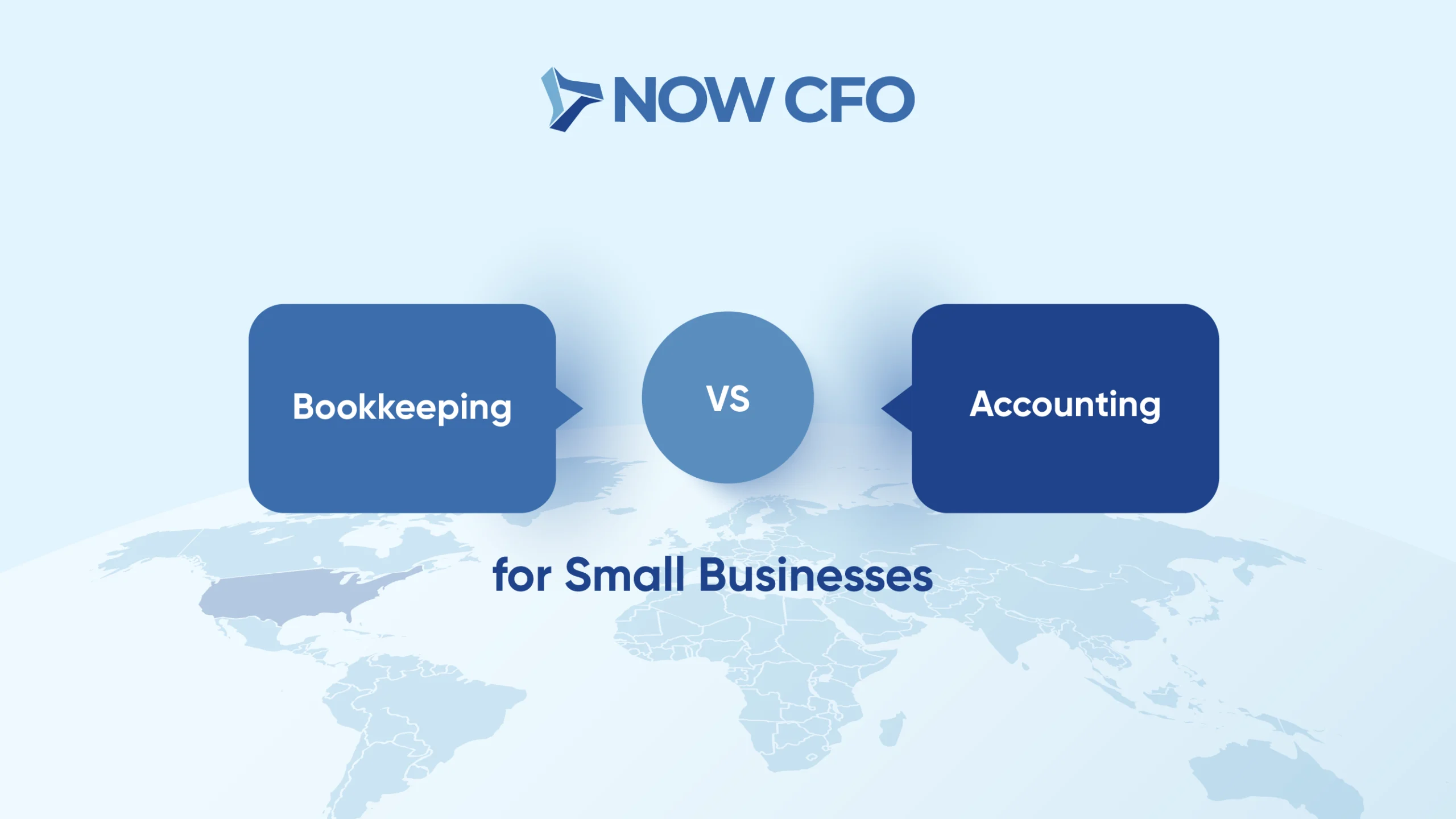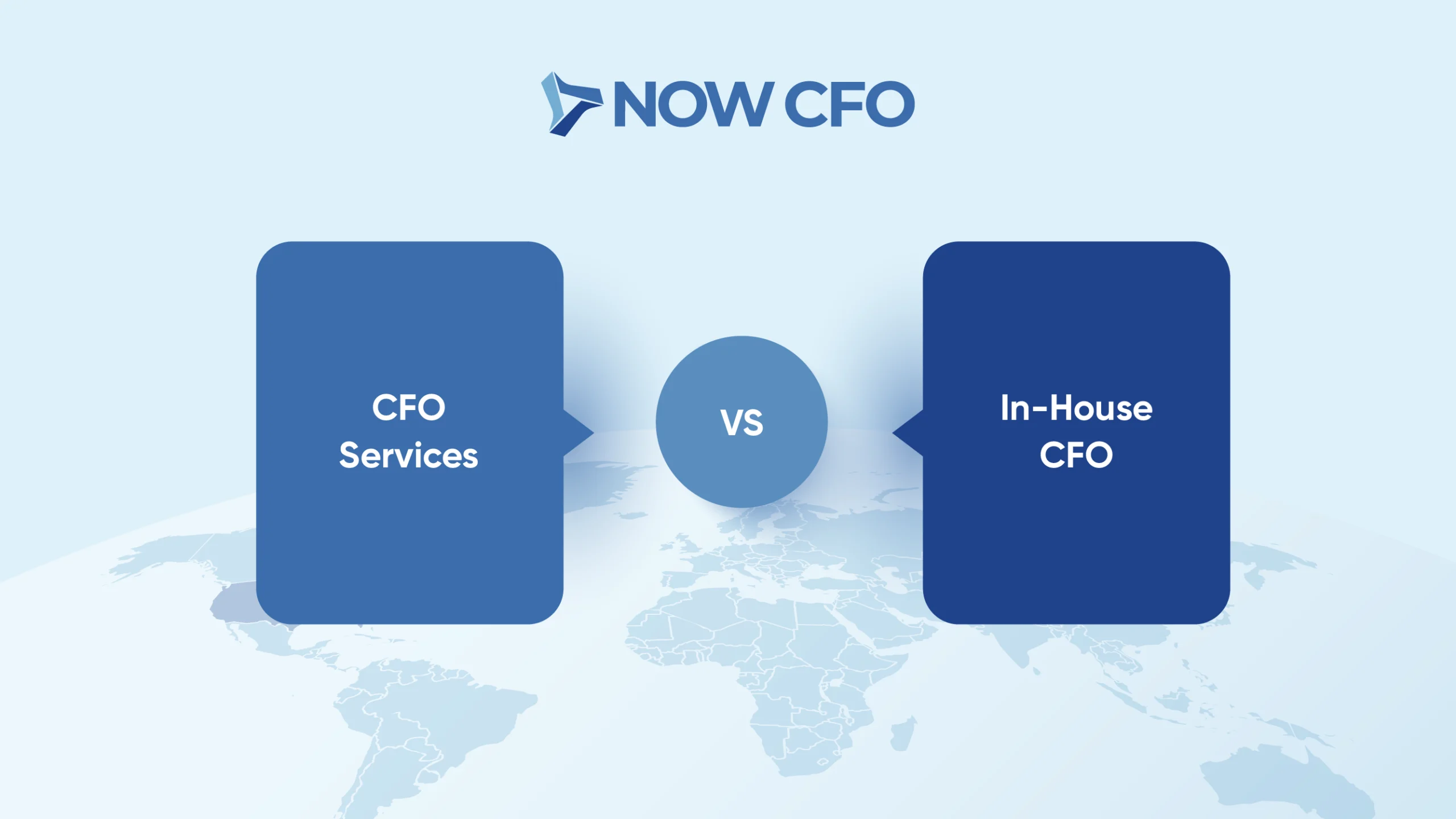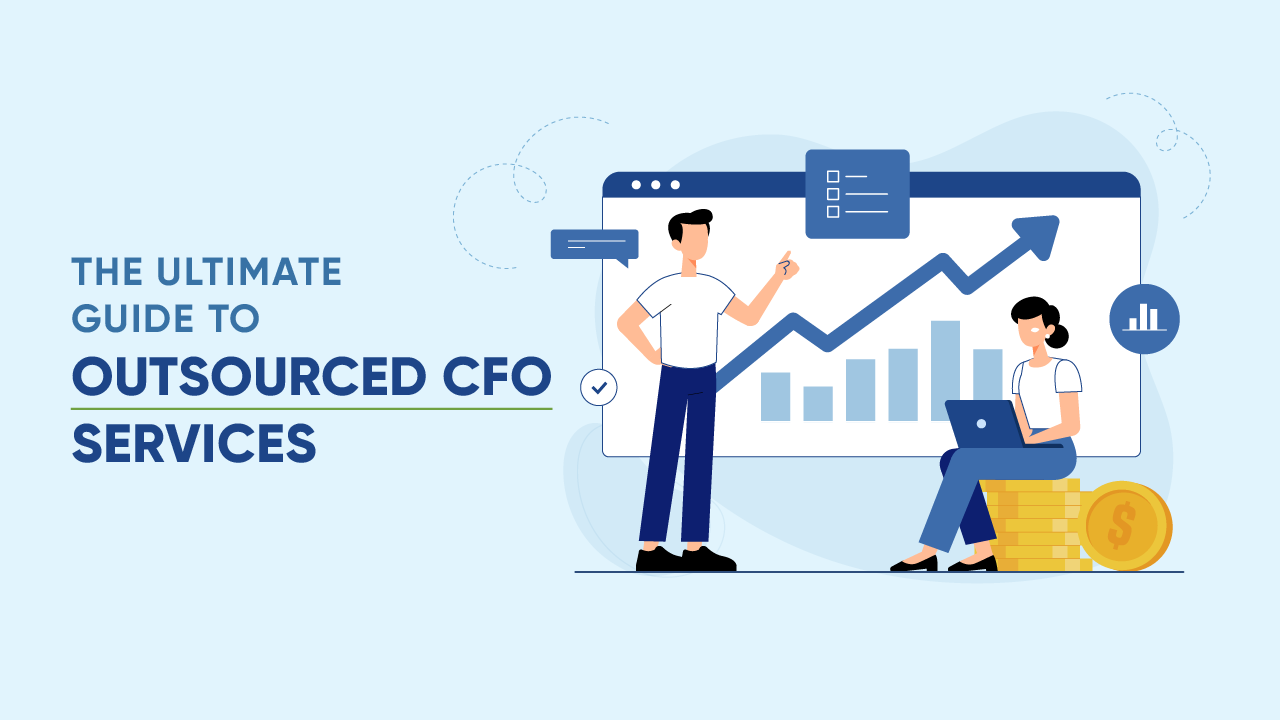
Managing the financial side of a growing business is no small task. As organizations scale, they often find themselves juggling complex decisions without internal expertise to handle it all.
According to a 2023 WSJ report, over 80% of early-stage businesses in the U.S. don’t have a CFO. This gap leaves firms vulnerable to cash flow issues, poor financial visibility and missed growth opportunities.
That’s where an outsourced CFO can provide a decisive advantage. Companies can access high-level financial leadership flexibly rather than committing to the high costs of a full-time CFO. Through this guide, we explore how outsourced CFOs differ from in-house executives.
What is an Outsourced CFO?
An outsourced CFO is a financial expert who provides strategic financial management services to businesses part-time, temporarily, or contractually. This arrangement allows companies to benefit from seasoned financial leadership without the overhead associated with a full-time position.
Definition and Key Responsibilities
An outsourced CFO assumes the role of CFO but operates externally, offering services tailored to the business’s specific needs. Key responsibilities include:
- Financial Strategy Development: Crafting comprehensive financial plans that align with the company’s long-term objectives.
- Budgeting and Forecasting: Preparing detailed budgets and financial forecasts to guide decision-making.
- Cash Flow Management: Monitoring and optimizing cash inflows and outflows to maintain liquidity.
- Risk Management and Compliance: Identifying financial risks and ensuring adherence to regulatory standards.
- Financial Reporting: Generating accurate financial reports to provide insights into the company’s financial health.
How Outsourced CFOs Differ from In-House CFOs
While both outsourced and in-house CFOs aim to enhance a company’s financial performance, they differ in several aspects:
- Cost Efficiency: Engaging an outsourced CFO is often more cost-effective, as businesses pay for services only when needed, avoiding the expense of full-time salary and benefits.
- Flexibility: Outsourced CFOs offer scalable services, adapting to the evolving needs of the business, whereas in-house CFOs represent a fixed resource.
- Diverse Expertise: Outsourced CFOs typically bring experience from various industries, providing a broad perspective that can be invaluable for strategic planning.
Types of Businesses That Benefit from Outsourced CFOs
Various organizations can leverage the outsourced, cost-effective CFO services, including:
- Startups and SMEs: These entities often lack the resources for a full-time CFO but still require strategic financial guidance in growth phases.
- Companies Undergoing Transition: Businesses experiencing M&A or restructuring benefit from the objective insights of an outsourced CFO.
- Organizations Facing Financial Challenges: Companies facing cash flow issues, rapid expansion, or market volatility can utilize virtual CFO solutions to develop and implement effective financial strategies.
Common Misconceptions About Outsourced CFOs
Despite the benefits, some misconceptions persist regarding outsourced CFO services:
- Limited Commitment: Some believe outsourced CFOs may not be as dedicated as in-house staff. However, reputable providers prioritize client success and integrate seamlessly with internal teams.
- Lack of Industry Knowledge: Many share concerns about outsourced CFOs lacking specific industry experience. Many possess diverse backgrounds, enabling them to adapt quickly to various sectors.
- Security Risks: Entrusting sensitive financial information to an external party can raise security concerns. Professional interim CFOs implement stringent data protection measures to safeguard client information.
The Evolution of CFO Outsourcing
The concept of outsourcing CFO functions has evolved significantly:
- Technological Advancements: The rise of digital communication tools has facilitated remote collaboration, making outsourced CFO services more accessible and efficient.
- Changing Business Needs: As companies seek agility and cost-effectiveness, the demand for flexible financial leadership has increased, driving the popularity of outsourcing.
- Proven Success: Numerous businesses have experienced enhanced financial performance through external CFO services, solidifying the model’s credibility.
Outsourced CFO vs. In-House CFO: Pros, Cons & How to Choose
Selecting the appropriate financial leadership is a pivotal decision for any organization. Understanding the distinctions between an outsourced CFO and an in-house CFO can guide businesses toward a choice that aligns with their strategic goals.
Cost Comparison of Outsourced vs. In-House CFO
Financial considerations often drive the decision between hiring an in-house CFO and engaging in outsourced CFO services.
- In-house CFO: Employing a full-time CFO entails substantial financial commitment. For example, the CFO at Golden State Water Company receives an annual salary of $235,000. Additionally, costs for benefits, bonuses, and other compensations can further elevate the total expenditure.
- Outsourced CFO: Outsourcing provides a more flexible cost structure, allowing businesses to pay for services as needed. This model can lead to significant savings, with some studies indicating that companies can reduce costs by up to 60% when outsourcing accounting functions.
Flexibility and Scalability Considerations
The dynamic nature of business requires financial leadership that can adapt to changing needs.
- In-house CFO: While offering a consistent presence, an in-house CFO represents a fixed resource. Scaling their role to match fluctuating business demands can be challenging and may involve additional costs.
- Outsourced CFO: Outsourced services offer unparalleled flexibility, enabling companies to adjust the level of financial oversight based on current requirements. This scalability is particularly beneficial for growing businesses or those experiencing seasonal variations.
Outsourced financial management services help organization meet their evolving needs, ensuring agility and cost-effectiveness.
Level of Expertise and Industry Knowledge
The breadth and depth of a CFO’s expertise can significantly impact a company’s financial health.
- In-house CFO: An internal CFO develops deep institutional knowledge specific to the company but may have limited exposure to diverse industries or the latest financial practices.
- Outsourced CFO: Professionals offering outsourced CFO services often possess extensive experience across various sectors. This exposure equips them with a broad skill set and familiarity with innovative financial strategies.
Hands-On vs. Strategic Leadership Roles
The role of a CFO encompasses both strategic planning and day-to-day financial management.
- In-house CFO: An in-house CFO is embedded within the organization and can engage in both strategic initiatives and operational tasks, offering hands-on involvement in daily activities.
- Outsourced CFO: Typically focuses on strategic guidance, providing high-level oversight while delegating routine financial operations to internal staff or other service providers.
Which Option is Best for Your Business?
Deciding between an in-house and an outsourced CFO depends on several factors:
- Business Size and Stage: CFO outsourcing for small businesses finds the flexible and cost-effective nature of the service more suitable.
- Financial Complexity: Companies with intricate financial operations might benefit from the constant presence of an in-house CFO.
- Budget Constraints: Organizations aiming to manage costs effectively may prefer the scalable expenses associated with outsourcing.
By carefully evaluating these considerations, businesses can choose the CFO model that best aligns with their operational needs and strategic objectives.
Outsourced CFO vs. Fractional CFO: Key Differences
Appropriate financial leadership options are crucial for businesses aiming to optimize their financial strategies. Understanding the distinctions between an outsourced CFO and a fractional CFO can guide organizations in selecting the model that best aligns with their needs.
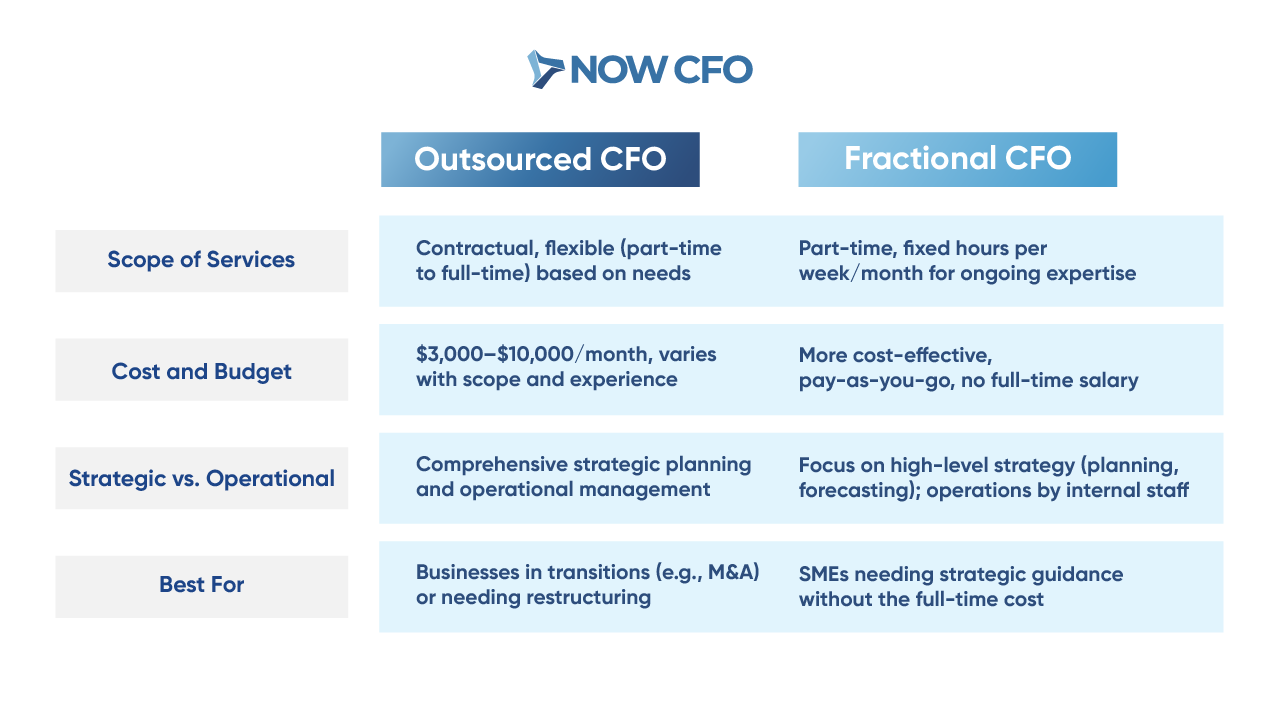
Learn More: Fractional CFO Service
Scope of Services: Full-Time vs. Part-Time Leadership
The engagement level of financial leadership varies significantly between outsourced and fractional CFOs.
- Outsourced CFO: Engaged on a contractual basis, an outsourced CFO can provide services ranging from part-time to full-time, depending on the organization’s requirements. This flexibility allows businesses to tailor the CFO’s involvement to their needs.
- Fractional CFO: Typically operates part-time, dedicating a predetermined number of hours per week or month to the client. This arrangement suits companies needing ongoing financial expertise but not requiring a full-time commitment.
By understanding these distinctions, businesses can determine the level of leadership engagement that aligns with their operational demands.
Cost and Budget Considerations
Financial implications are pivotal in deciding between an outsourced and a fractional CFO.
- Outsourced CFO: Costs can vary widely based on the scope of services and time commitment. Monthly fees typically range from $3,000 to $10,000, influenced by factors such as the complexity of services and the CFO’s experience level.
- Fractional CFO: Generally more cost-effective for businesses requiring limited financial oversight. The pay-as-you-go model allows companies to access high-level financial guidance without the expense of a full-time hire.
Strategic vs. Operational Focus
The emphasis on financial leadership can differ between outsourced and fractional CFOs.
- Outsourced CFO: This type of CFO often provides comprehensive services encompassing strategic planning and operational management. This holistic approach is beneficial for organizations seeking an all-encompassing financial strategy.
- Fractional CFO: Typically concentrates on high-level strategic initiatives, offering insights and guidance on financial planning, forecasting, and growth strategies. Operational tasks may be handled by internal staff or other service providers.
Which Businesses Benefit Most from Each Model?
The suitability of outsourced versus fractional CFO services depends on various factors, including company size, growth stage, and financial complexity.
- Outsourced CFO: Ideal for businesses to undergo significant transitions, such as mergers or acquisitions, or those requiring extensive financial restructuring. The broader scope of services supports complex financial needs during critical periods.
- Fractional CFO: Suited for SMEs that need strategic financial guidance without the burden of a full-time salary. This model offers flexibility and cost savings while providing access to seasoned financial expertise.
How NOW CFO Offers Both Outsourced and Fractional CFO Solutions
NOW CFO recognizes that businesses have diverse financial leadership needs and offers both part-time CFO and fractional CFO.
- Tailored Engagements: Whether a company needs comprehensive financial oversight or a financial strategy advisor, NOW CFO provides customized solutions that align with the organization’s objectives.
- Experienced Professionals: With a team of seasoned financial experts, NOW CFO delivers high-quality services, ensuring that businesses receive the expertise necessary.
- Flexible Pricing Models: Understanding the importance of cost-effectiveness, NOW CFO offers adaptable pricing structures that cater to budgetary constraints.
Learn More: Outsourced CFO Vs Fractional CFO
Key Benefits of Outsourced CFO Hiring
Engaging an outsourced CFO offers numerous advantages for businesses seeking to enhance their financial management without the commitment of a full-time executive. From significant cost savings to improved financial planning, outsourced CFO services provide strategic benefits tailored to the evolving needs of companies.
Cost Savings Compared to Full-Time CFO
Employing a full-time Chief Financial Officer entails substantial financial commitments, including a high salary, benefits, bonuses, and other compensations. The median annual wage for a CFO is $300K to $500K.
In contrast, outsourcing CFO functions allows businesses to access top-tier financial expertise at a fraction of the cost. This model enables companies to pay for services as needed, effectively reducing overhead expenses.
Access to High-Level Financial Expertise
Outsourced CFOs bring a wealth of experience across various industries, providing businesses with insights that might be unavailable internally. Their diverse backgrounds equip them to handle complex financial scenarios, from strategic planning to risk management.
Scalability and Flexibility for Growing Businesses
As businesses grow, their financial management needs fluctuate. Outsourced CFO services offer the flexibility to scale support up or down based on current requirements. Companies can adjust the level of CFO involvement without the constraints associated with a full-time position.
Improved Cash Flow and Financial Planning
Effective cash flow management is critical for sustaining operations and fueling growth. Outsourced CFOs implement robust financial planning strategies to optimize cash flow, including budgeting, forecasting, and economic analysis.
Identifying trends and potential challenges early helps businesses maintain the liquidity necessary to meet obligations and seize new opportunities.
Risk Mitigation and Compliance Management
Clear understanding of financial regulations is challenging, especially for small to medium-sized enterprises. Compliance with environmental regulations, for instance, costs 364% more in small firms than in large firms.
Outsourced CFOs assist in developing and implementing compliance strategies, reducing the risk of legal issues and financial penalties. Their expertise ensures businesses adhere to relevant laws and regulations, safeguarding against potential liabilities.
Learn More: Benefits of hiring an outsourced CFO
How an Outsourced CFO Improves Financial Planning & Business Growth
Engaging an outsourced CFO can significantly enhance a company’s financial planning and drive business growth. By providing strategic insights and leveraging advanced technologies, outsourced CFOs offer tailored solutions for growth.
Developing Long-Term Financial Strategies
Crafting a robust long-term financial strategy is essential for sustainable growth. An outsourced CFO collaborates with business leaders to develop comprehensive plans that align with the company’s vision and market dynamics. This process includes:
- Market Analysis: Evaluating current market trends to identify opportunities and threats.
- Financial Forecasting: Projecting future revenues, expenses, and capital needs.
- Resource Allocation: Prioritizing investments to maximize returns and support strategic objectives.
Enhancing Cash Flow Management and Budgeting
Effective cash flow management is vital for maintaining liquidity and funding operations. Outsourced CFOs implement strategies to optimize cash inflows and outflows, ensuring the company can meet its obligations and invest in growth opportunities. Key activities include:
- Budget Development: Create detailed budgets reflecting operational needs and strategic priorities.
- Expense Monitoring: Tracking expenditures to prevent overspending and identify cost-saving opportunities.
- Receivables Management: Implementing policies to accelerate collections and reduce outstanding debts.
Preparing for Investment, M&A, or Expansion
When considering investments, M&A, or expansion, the expertise of an outsourced CFO is invaluable. They provide critical support by:
- Due Diligence: Assessing potential ventures’ financial health and risks.
- Valuation Analysis: Determining the fair value of target companies or investment opportunities.
- Integration Planning: Developing strategies to combine operations post-merger or acquisition seamlessly.
Reducing Financial Risk and Ensuring Stability
Identifying and mitigating financial risks is crucial for maintaining business stability. Outsourced CFOs employ various techniques to safeguard the company’s assets and reputation, including
- Risk Assessment: Evaluating potential financial threats and their impact on the business.
- Compliance Monitoring: Ensuring adherence to financial regulations and standards to avoid legal penalties.
- Internal Controls Implementation: Establishing procedures to prevent fraud and errors within financial operations.
Leveraging Technology for Data-Driven Decision-Making
Today, technology is essential for informed financial decision-making. Outsourced CFOs integrate advanced financial systems and analytics tools to:
- Automate Processes: Streamline routine tasks to improve efficiency and reduce human error.
- Analyze Data: Interpret complex financial data to uncover trends and inform strategic choices.
- Enhance Reporting: Provide real-time financial reports for better visibility of company financial status.
How NOW CFO Provides Industry-Leading Outsourced CFO Services
At NOW CFO, we pride ourselves on delivering industry-leading outsourced CFO services tailored to meet each client’s unique needs. Our comprehensive approach ensures that businesses receive expert financial guidance and support, driving growth and success.
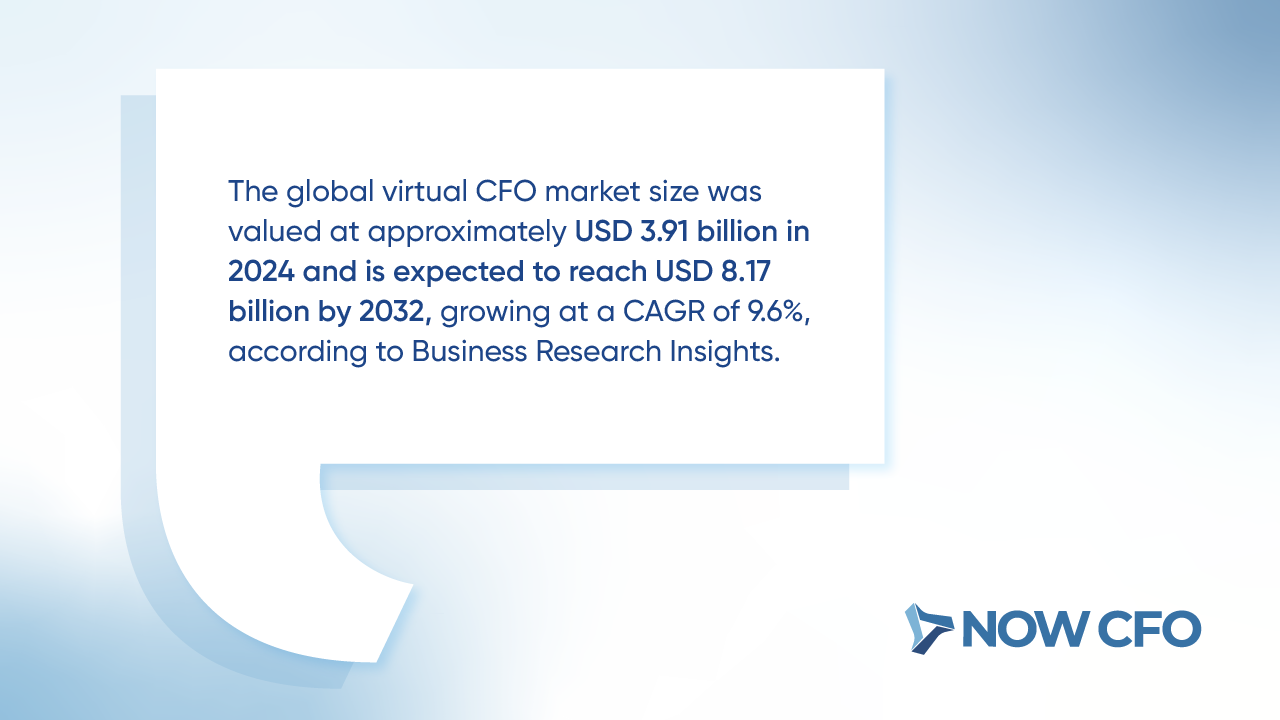
The global virtual CFO market size was valued at approximately USD 3.91 billion in 2024 and is expected to reach USD 8.17 billion by 2032, growing at a CAGR of 9.6%, according to Business Research Insights.
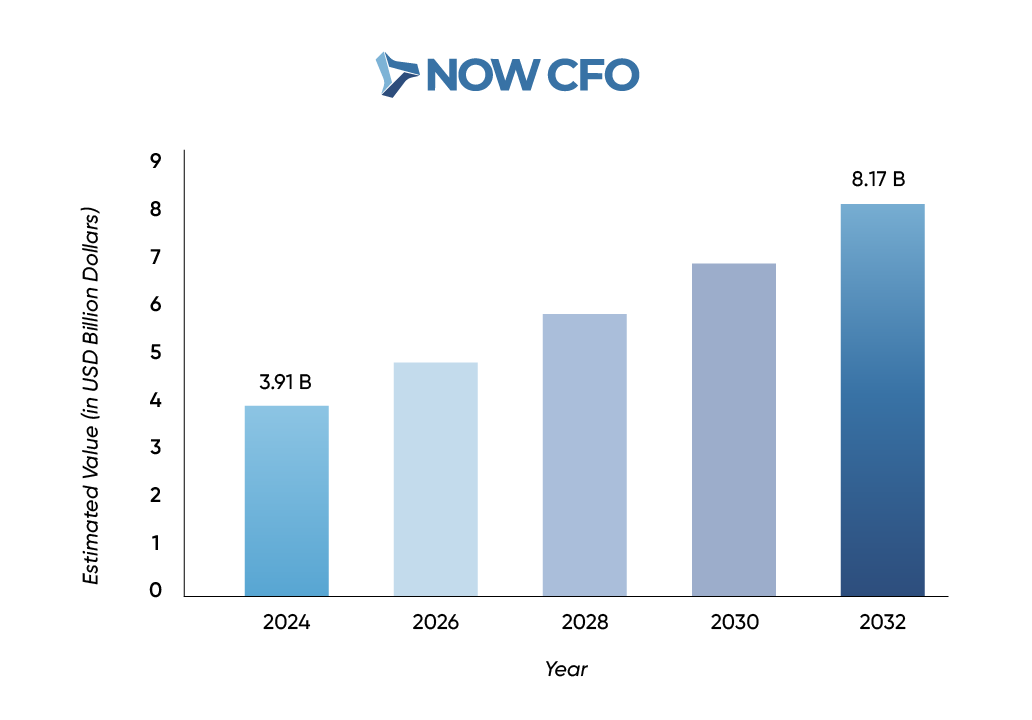
Tailored Financial Strategies for Businesses
Understanding that no two businesses are alike, we develop customized financial strategies that align with your company’s goals and challenges. Our process includes:
- In-depth analysis: We thoroughly assess your financial health, market position, and operational dynamics.
- Strategic Planning: Based on our analysis, we craft detailed financial plans that focus on long-term growth and profitability.
- Continuous Monitoring: We regularly review and adjust strategies to adapt to market changes and emerging opportunities.
Hands-On Approach to Financial Oversight
Our team believes in a proactive, hands-on approach to financial management. We integrate seamlessly into your operations to provide:
- Daily Financial Management: Overseeing accounting functions, cash flow, and expense control to maintain financial stability.
- Risk Assessment: Identifying potential financial risks and implementing mitigation strategies to protect your assets.
- Regulatory Compliance: Ensuring adherence to financial regulations and standards to avoid legal complications.
Experience Across Multiple Industries
With a diverse portfolio spanning various sectors, our consultants bring a wealth of experience to the table. This cross-industry expertise enables us to:
- Adapt Best Practices: Implement proven financial strategies from different industries to benefit your business.
- Innovate Solutions: Apply creative problem-solving techniques tailored to your industry’s unique challenges.
- Benchmark Performance: Compare your financial metrics against industry standards to identify areas for improvement.
Seamless Integration with Internal Teams
We understand the importance of collaboration and working diligently to integrate with your existing teams. Our approach includes:
- Open Communication: Establishing clear channels for information sharing and feedback.
- Collaborative Planning: Working alongside your staff to develop and implement financial strategies.
- Training and Support: Providing guidance and education to enhance your team‘s financial acumen.
Custom Reporting and Data-Driven Decision Making
Informed decision-making is crucial. We provide customized reporting and analytics to support strategic choices, including:
- Financial Dashboards: Visual representations of key metrics for quick insights.
- Performance Analysis: Detailed reports on financial performance, highlighting strengths and areas for improvement.
- Predictive Modeling: Utilizing historical data to forecast future trends and inform planning.
By partnering with NOW CFO, you can access a team that provides exceptional strategic financial planning services that drive your business’s success.
Overcoming Common Challenges When Hiring an Outsourced CFO
Engaging an outsourced CFO can significantly enhance a company’s financial strategy and operations. However, addressing common challenges that may arise during the integration process is essential to capitalize on this partnership fully.
Ensuring Smooth Onboarding and Transition
A seamless onboarding process is critical to integrate an outsourced CFO effectively into your organization. To achieve this, we recommend:
- Developing a Comprehensive Onboarding Plan: Outline KPIs, expected results, and deadlines to align the outsourced CFO’s efforts with organizational goals.
- Focusing on Technology: Ensure the necessary technological tools and systems are in place to support remote collaboration and data sharing.
- Establishing Regular Check-Ins: Schedule consistent meetings to monitor progress, address concerns, and provide feedback, fostering a collaborative environment.
Establishing Clear Roles and Expectations
Defining the scope of responsibilities and performance expectations is vital to prevent misunderstandings. We suggest:
- Communicating Roles and Objectives: Clearly define and communicate the engagement’s needs, including each team member’s roles.
- Documenting Agreements: Formalize roles, responsibilities, and expectations in a written agreement to serve as a reference point throughout the engagement.
Maintaining Effective Communication with Leadership
Open and consistent communication between the outsourced CFO and company leadership is essential for success. To promote effective dialogue, we recommend:
- Scheduling Regular Meetings: Set periodic meetings to discuss financial performance, strategic initiatives, and emerging issues.
- Utilizing Multiple Communication Channels: Use various platforms, such as video calls, emails, and instant messaging, to facilitate timely and efficient communication.
- Encouraging Feedback: Create an environment where both parties feel comfortable sharing insights and suggestions to enhance collaboration.
Learn More: Overcoming Common Challenges When Hiring an Outsourced CFO
Addressing Data Security and Compliance Concerns
Protecting sensitive financial data is paramount when outsourcing CFO services. To mitigate risks, we implement
- Conducting Due Diligence: Before selecting an accounting outsourcing service, we examine the partner’s data security procedures, practices, and history.
- Implementing Strong Access Controls: Limit data access to authorized personnel based on roles and responsibilities, ensuring that only those who need information can access it.
- Ensuring Compliance with Regulations: Adhere to relevant data protection laws such as GDPR or CCPA and regularly audit compliance to maintain data integrity.
Measuring the ROI of Outsourced CFO Services
Evaluating the ROI is crucial to assessing outsourced CFO services’ effectiveness. We focus on:
- Defining KPIs: Establish metrics such as cost savings, revenue growth, and improved financial processes to measure success.
- Analyzing Financial Performance: Regularly review financial statements and reports to identify trends and assess the impact of the outsourced CFO’s contributions.
- Soliciting Stakeholder Feedback: Gather insights from internal teams and leadership to evaluate satisfaction and areas for improvement.
When Should You Consider Hiring an Outsourced CFO?
Determining the right time to engage an outsourced CFO is pivotal for businesses aiming to enhance their financial management and strategic planning. Recognizing the signs that indicate the need for such expertise can lead to informed decisions that foster growth.
Signs Your Business Needs Financial Leadership
As businesses evolve, specific indicators suggest the necessity for advanced financial oversight:
- Rapid Revenue Growth with Declining Profit Margins: Experiencing increased sales but noticing a dip in gross profit margins may signal inefficiencies in cost management or pricing strategies.
- Overwhelming Financial Management Tasks: Struggling with complex financial operations can hinder strategic decision-making and daily operations.
- Inconsistent Cash Flow: Facing challenges in managing expenses and maintaining liquidity can jeopardize business operations.
Comparing In-House CFO vs. Outsourced CFO Costs
Evaluating the financial implications of hiring an in-house CFO versus outsourcing is crucial:
- Salary and Benefits: An in-house CFO commands a substantial salary and benefits, which can be a significant financial commitment.
- Flexibility: Outsourced CFOs offer services on a flexible basis, allowing businesses to pay only for the expertise they need, which can be more cost-effective.
How an Outsourced CFO Supports Business Growth
An outsourced CFO contributes to business expansion through:
- Strategic Financial Planning: Developing comprehensive financial strategies that align with business objectives.
- Cash Flow Management: Implementing practices to optimize cash flow, ensuring resources are available for growth initiatives.
- Risk Management: Identifying and mitigating financial risks that could impede expansion efforts.
Financial Challenges an Outsourced CFO Can Solve
Engaging an outsourced CFO can address several financial hurdles:
- Complex Financial Operations: Streamlining processes to enhance efficiency and accuracy.
- Budgeting and Forecasting: Providing detailed financial projections to guide strategic decisions.
- Compliance and Reporting: Ensuring adherence to financial regulations and accurate reporting.
Case Study: Businesses That Thrived with an Outsourced CFO
Consider the case of a franchisee organization that expanded from two to ten stores over three years. By partnering with an outsourced CFO, they achieved
- Enhanced Financial Reporting: Improved accuracy and timeliness in financial statements.
- Strategic Growth Planning: Developed and executed expansion strategies effectively.
- Operational Efficiency: Streamlined processes leading to better resource management.
Best Practices for Working with an Outsourced CFO
Collaborating with an outsourced CFO can significantly enhance your organization’s financial management and strategic growth. To maximize this partnership, it’s essential to implement best practices that ensure alignment, efficiency, and security.
Setting Clear Financial Goals and Expectations
Establishing well-defined financial objectives is the foundation of a successful collaboration with an outsourced CFO. Clearly articulate your organization’s short-term and long-term goals, such as:
- Revenue targets
- Profitability benchmarks
- Cost reduction initiatives
- Expansion plans
Establishing Strong Communication Channels
Effective communication is vital when integrating an outsourced CFO into your team. To foster seamless collaboration:
- Regular Meetings: Schedule consistent check-ins to discuss financial performance, address concerns, and adjust strategies as needed.
- Defined Points of Contact: Assign specific team members as liaisons to streamline information flow.
- Transparent Reporting: Ensure financial reports are clear, concise, and accessible to relevant stakeholders.
Leveraging Technology for Financial Insights
Utilizing advanced financial technologies can enhance the efficiency and accuracy of your outsourced CFO’s work. Consider:
- Cloud-Based Accounting Software: Facilitates real-time access to financial data.
- Data Analytics Tools: Provides deeper insights into financial trends and performance metrics.
- Secure Communication Platforms: Ensures safe and efficient information exchange.
Monitoring Performance Metrics and KPIs
Regular assessment of KPIs is crucial to evaluate the effectiveness of financial strategies implemented by the outsourced CFO. Focus on metrics such as:
- Cash Flow: Monitor the inflow and outflow of cash to ensure liquidity.
- Gross Profit Margin: Assess the profitability of products or services.
- ROI: Evaluate the efficiency of investments.
Ensuring Data Security and Compliance
Protecting sensitive financial information is paramount when working with an outsourced CFO. Implement measures such as:
- Conducting Due Diligence: Before engaging an outsourced CFO, assess their data security protocols and compliance with relevant regulations.
- Establishing Strong Contracts: Draft agreements clearly define data protection expectations and responsibilities.
- Implementing Access Controls: Restrict data access to authorized personnel only.
- Regular Security Audits: Review security measures to identify and address vulnerabilities.
How to Choose the Right Outsourced CFO for Your Business
Selecting the right outsourced CFO is vital for your business’s financial health. To make an informed decision, consider several key factors.
Evaluating Industry Experience and Expertise
Begin by assessing the outsourced CFO’s experience within your industry. Familiarity with sector-specific challenges and regulations enables them to provide tailored financial strategies.
For instance, a CFO with a background in manufacturing will understand supply chain complexities, while one in tech startups may focus on rapid scaling and fundraising nuances.
Understanding Cost Structures and Service Models
Financial commitment varies among outsourced CFOs. Monthly fees can range from $3,000 to $10,000, influenced by the scope of services and company size. Hourly rates typically fall between $185 and $350.
Clarify whether the CFO charges hourly, monthly, or per project, and ensure transparency regarding any additional costs.
Assessing Client Reviews and Case Studies
Investigate the CFO’s track record by reviewing client testimonials and case studies. Positive feedback and documented successes indicate reliability and effectiveness. Request references to gain insights into their performance and client satisfaction levels.
Questions to Ask Before Hiring an Outsourced CFO
Prepare a set of questions to evaluate potential CFOs:
- What industries do you specialize in?
- Can you provide examples of past projects like our needs?
- How do you approach financial planning and risk management?
- What is your availability for ongoing support?
These inquiries help determine if their expertise aligns with your business objectives.
Comparing NOW CFO to Other Outsourced CFO Providers
At NOW CFO, we pride ourselves on delivering customized financial solutions across various industries. Our team integrates seamlessly with your internal staff, ensuring effective communication and collaboration.
With a focus on data-driven decision-making, we provide comprehensive reports tailored to your business needs. Our transparent pricing and commitment to client success distinguish us from other providers.
Conclusion: Transform Your Business with Outsourced CFO Services
Working with an outsourced CFO can be game-changing for business owners and executives seeking clarity, control, and confidence in their financial future. From building customized financial strategies to managing compliance and risk, outsourced CFO services help unlock growth and ensure long-term sustainability.
At NOW CFO, we bring hands-on expertise, industry-specific knowledge, and proactive guidance to every engagement. Whether you’re preparing for expansion or need a sharper financial focus, we’re ready to support your goals.
Start your journey today. Schedule a no-pressure, free consultation to learn how we can help you build a brighter financial future.




